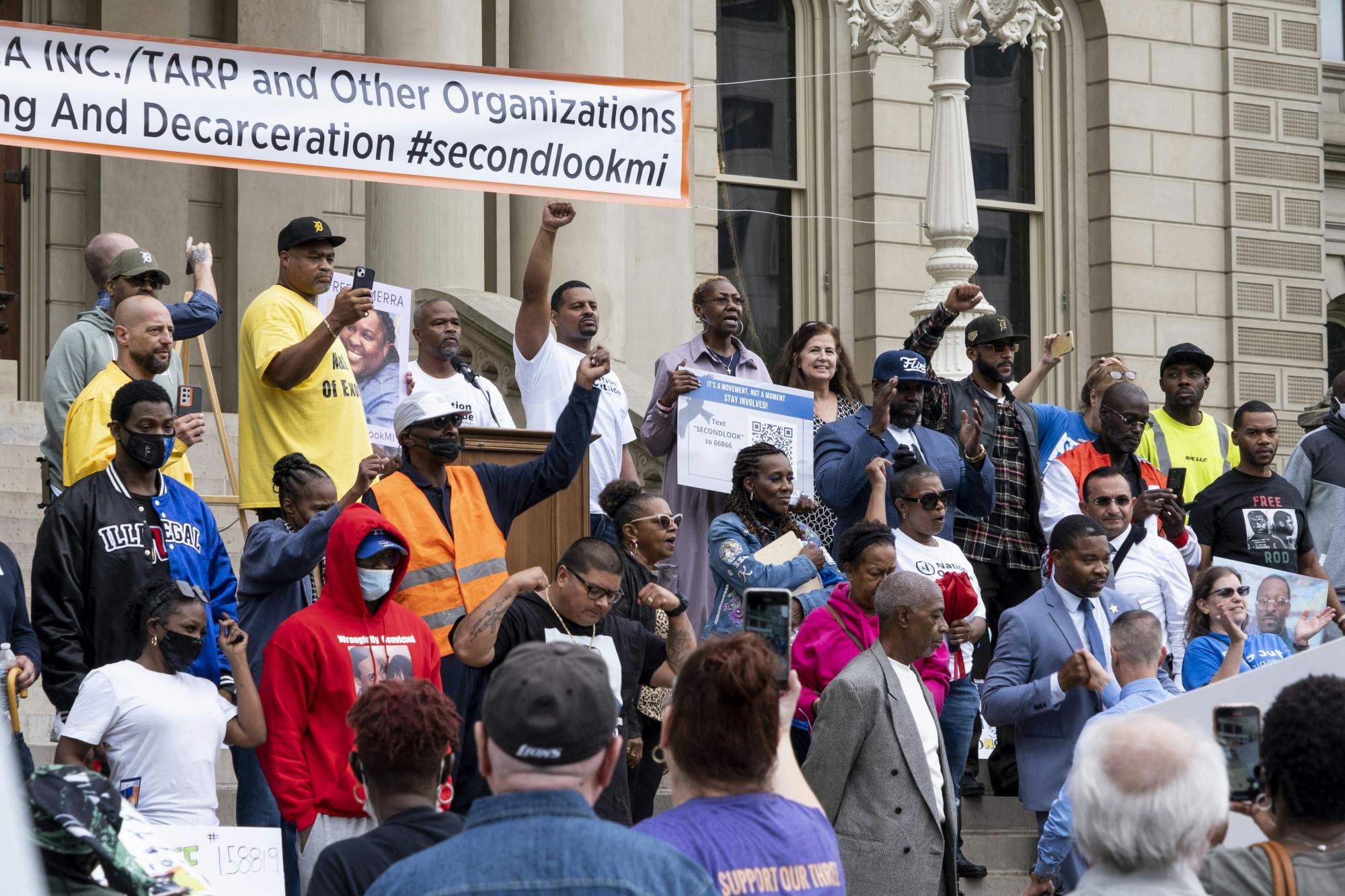Although the forecast called for clouds and rain, the skies cleared and the sun shined down on those who gathered at the State Capitol on Thursday afternoon for the Criminal Justice Reform Rally.
Opening with song and prayer, hundreds of those affected by mass incarceration held their signs high and sang high the names of their currently-imprisoned loved ones, rallying in support of the Second Look Act which emphasizes the need to end mass incarceration.
According to www.congress.gov, "The Second Look Act of 2019 allows a defendant who has served at least 10 years in prison to petition a federal court for a sentence reduction." This gives a new sense of hope for those who have been unjustly incarcerated and thought their chance for redemption was over.
The event was organized by the National Lifers of America -- a nonprofit Michigan corporation who, according to their Facebook, "is a group of Michigan prisoners whose purpose is to effect changes in the state laws which govern First and Second degree Lifers, as well as those serving long and indeterminate sentences."
The event included speakers who are currently behind bars, speaking over the phone and into the microphone about racial disparities in our criminal justice system and the unlawfulness of mass incarceration in America.
Eddie "Malijah-X" Gee, who has been incarcerated for 34 years now for second-degree homicide in Oct. of 1987, when he was 17. was able to have his voice heard at the rally.
"The writers of this constitution were individuals who strongly believed in freedom, justice and equality, as well as the constitutional and the consistent advancement of America as a whole," Gee said. "However, it is only logical for us to wonder, how can our nation be so great, so free, so advanced, but yet has the largest prison population than any other nation in the civilized world?"
As of this July, the United States has the largest number of prisoners, detaining 2,094,000 people. That's 384 more people than second place China, and 1,334,482 more people than third place Brazil, according to Statistica.
"What do we think about Black men coming to prison at alarming rates?" Gee said. "How can we stand here today and say that we are against systemic racism and the murdering of George Floyd, but not be willing to challenge mass incarceration as it relates to the overwhelming racial disparities that exist within our criminal, prison justice system?"
Michigan is no exception to the presence of systemic racism, as it is one of 12 states where Black people make up more than half of the state's prison population. According to Vera, the Black incarceration rate has increased 88% from 1978 to 2017, and Black people now make up 53% of the prison population in Michigan.
According to safeandjustmi.org, as of March 2021, there are 33,635 prisoners serving in Michigan's criminal justice system. While there were roughly 300 people who rallied around the eastside steps of the Capitol building, that is just a sliver of those affected by mass incarceration in Michigan alone.
"By throwing all these people away and incarcerating them, you're not protecting anybody," advocate Tasheena Lewis said. "You're creating a larger, vicious cycle. You're creating more drama with families, with these children growing up without parents, without grandparents."
Lewis is a prime example of how the effects of mass incarceration reach further than those convicted, as she fights for her grandfather who has been incarcerated for 46 years under guilt by association laws.
"The crime that he actually committed, at the time, was a five-year sentence," Lewis said. "However, he was refused a separate trial from the person who actually committed the crime, and so he was given three life-long sentences along with the murderer, and we've been fighting for him to get out ever since."
Lewis said she believes that the root of the issue lies in mental health and trauma, and as a teacher who largely works with children of trauma and as a child of trauma herself, Lewis has witnessed the heartbreaking effects of mass incarceration her whole life.
"These are our loved ones, and I know a lot of them were young," Lewis said. "This happens because they experienced trauma, and then as young adults, they made stupid choices and they never got the chance to be healed themselves."
Many speakers and attendees spoke on second chance -- how we need to change our view of those serving in prison and those who have served.
"We deserve a second chance," Gee said. "Society has to take a look at us, they have trust in us. They have trust in the very idea of what America is founded on, which is a second chance."
"People age out of crime and learn from past behavior," Gee said. "Simply because a person has been convicted of a violent offense does not necessarily mean that the individual is a violent person, or remains a violent person for the rest of their life."
Various speakers noted that ways to stay informed and to help fight this injustice is through reading literature and staying up to date with organizations such as Voting Access For All Coalition -- whose mission, according to Virginia Preuss, is to "support voting rights for people impacted by the justice system."
Support student media!
Please consider donating to The State News and help fund the future of journalism.
Discussion
Share and discuss “'Injustice anywhere is a threat to justice anywhere': Criminal justice reform rally at the Capitol” on social media.







